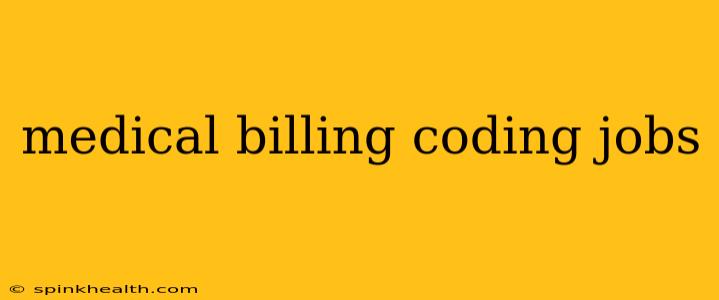Decoding the World of Medical Billing and Coding: A Career Deep Dive
The world of healthcare is vast and complex, but behind the scenes, ensuring smooth operations is a critical team: medical billers and coders. These professionals are the unsung heroes, translating medical services into understandable billing codes, ensuring healthcare providers get paid and patients receive accurate statements. If you're considering a career in this field, let's unravel the mysteries of medical billing and coding jobs.
My journey into this field started unexpectedly. A friend, a seasoned medical coder, described her work as a thrilling puzzle. Each patient encounter, each procedure, represented a unique code sequence she had to decipher. The challenge, she said, was satisfying, knowing her work directly impacted the financial health of clinics and hospitals. Intrigued, I began researching, and what I discovered was a dynamic and rewarding career path.
What Does a Medical Biller Do?
Medical billers are the financial gatekeepers of healthcare. They're the ones who ensure that healthcare providers receive payment for the services they provide. This involves a multi-step process:
- Creating and submitting claims: Billers take the information provided by coders and translate it into claims that are submitted to insurance companies. This requires meticulous attention to detail and a strong understanding of insurance regulations.
- Following up on claims: Not all claims are processed smoothly. Billers need to actively follow up on denied or rejected claims, resolving any issues and ensuring timely payment.
- Managing patient accounts: This includes handling patient payments, addressing billing inquiries, and maintaining accurate patient records.
- Working with insurance companies: Billers often have direct contact with insurance representatives to resolve billing discrepancies and ensure claims are processed correctly.
Essentially, medical billers are the financial advocates for healthcare providers. They're masters of navigating complex insurance systems and ensuring that providers get the reimbursements they deserve.
What Does a Medical Coder Do?
Medical coders are the language translators of the healthcare world. They take detailed medical records—doctor's notes, lab results, diagnostic images—and translate them into standardized medical codes. These codes, primarily using the ICD-10 (International Classification of Diseases, 10th Revision) and CPT (Current Procedural Terminology) coding systems, are the language insurance companies understand to process claims.
- Analyzing medical records: Coders carefully review medical records to identify the diagnoses, procedures, and services provided.
- Assigning codes: Based on their analysis, they assign the appropriate ICD-10 and CPT codes, ensuring accuracy and compliance with industry standards.
- Maintaining code accuracy: The coding system is constantly updated, so coders need to stay current with changes and ensure they're using the most accurate and up-to-date codes.
- Ensuring compliance: Coding is heavily regulated, and coders must adhere to strict guidelines to avoid errors and penalties.
What are the Different Types of Medical Billing and Coding Jobs?
The field isn't just about billing and coding; there are specialized roles:
- In-house vs. Outsource: Some medical billers and coders work directly for healthcare facilities, while others work for outsourcing companies providing these services to multiple clients.
- Specialty Focus: Coders and billers can specialize in specific areas like cardiology, oncology, or orthopedics, gaining deeper expertise in the medical terminology and coding specific to those areas.
What Skills are Needed for Medical Billing and Coding Jobs?
Success in this field requires a blend of hard and soft skills:
- Strong analytical skills: Both billers and coders need to analyze information accurately and efficiently.
- Attention to detail: Accuracy is paramount; even a small error can delay payment or lead to incorrect billing.
- Computer proficiency: Medical billing and coding software is essential for the job.
- Excellent communication skills: Billers interact with patients and insurance companies, so clear and professional communication is crucial.
- Knowledge of medical terminology: A solid understanding of medical terms is vital for both roles.
- Organizational skills: Managing multiple tasks, claims, and patient accounts requires strong organizational abilities.
How Much Do Medical Billing and Coding Jobs Pay?
Salaries vary depending on experience, location, and specialization, but generally speaking, it's a stable and relatively well-paying field.
What Education and Training is Required for Medical Billing and Coding Jobs?
Many medical billing and coding jobs require a certificate or associate degree. On-the-job training is also common.
Is a Medical Billing and Coding Career Right for Me?
If you enjoy detail-oriented work, have a knack for problem-solving, and are comfortable working with computers and medical terminology, a career in medical billing and coding might be a perfect fit. It's a field where your hard work directly impacts the healthcare system, providing a sense of purpose and accomplishment. The work is challenging, but the rewards are significant, both personally and professionally.

